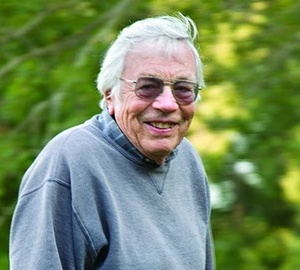Columbia College | Columbia University in the City of New York
Frank Graham Jr. ’50, Penned Silent Spring Sequel

Graham wrote Since Silent Spring, published in 1970, as an update to Carson’s 1962 text. While Carson had been praised for drawing attention to the dangers of DDT and pesticide use, industry groups and even other scientists harshly criticized her work. Graham’s book provided an overview of Carson’s research and detailed the organized smear campaign following its publication; he also offered an update on pesticide regulations since 1962 and the action (and inaction) of the government to address environmental harms.
“For some scientists, it seems, Silent Spring was a polemic, a diatribe. It did not give both sides of the argument — as a scientist, her critics insisted, she ought to have presented both the pros and cons of extensive pesticide use,” Graham wrote in a retrospective article for Yale E360 in 2012. “But that was just her point. Carson saw no reason to praise pesticide use as it was carried out at the time.”
Born in 1925 in New York City, Graham spent much of his childhood in New Rochelle, N.Y., developing a love for the natural world. He served in the Navy in WWII and fought in the Battle of Okinawa in 1945.
Graham graduated from the College with an English degree, at 25. His father, a well-known sports reporter for The Sun and the New York Journal-American, used his connections to get his son a job with the Brooklyn Dodgers as a publicity director. Graham eventually moved into sports reporting himself as a writer for Sport magazine. He freelanced for a number of publications including The Saturday Evening Post, Reader’s Digest and Sports Illustrated.
One of his articles is the basis for the precedent-setting 1967 Supreme Court case Curtis Publishing v. Butts. Graham’s story for The Saturday Evening Post detailed how University of Georgia athletics director Wally Butts had allegedly conspired with University of Alabama head football coach Bear Bryant to fix football games. Butts and Bryant both sued Curtis Publishing, and Butts’ lawsuit was heard by the Supreme Court, which used the case to determine when a public figure can sue for libel.
By the time this case was being litigated, however, Graham had turned his attention to writing about nature. His 1966 book, Disaster by Default: Politics and Water Pollution, caught the attention of Audubon Magazine; he was asked if he would be interested in writing a retrospective of Silent Spring. Graham was hired as a field editor by the magazine, where he spent the next 45 years, and published a three-part series about the impact of Carson’s work. Houghton Mifflin, her publisher, then asked Graham to write a book based on his own analysis, just as it had asked Carson to do years earlier.
Since Silent Spring brought new fire to the environmental movement as the federal government had just started the process of banning DDT a few months before the book was published. However, it took the EPA until 1972 to ban the pesticide, and farm workers and others exposed to dangerous chemicals continued to suffer from poisoning outbreaks throughout the 1960s. Graham’s book helped bring these incidents and the critiques of Carson’s work to light, as the environmental movement continued to press for stricter pesticide regulations through the rest of the century.
Graham is survived by his wife of seven decades, Ada.
— Emily Driehaus
Issue Contents
Published three times a year by Columbia College for alumni, students, faculty, parents and friends.
Columbia Alumni Center
622 W. 113th St., MC 4530, 6th Fl.
New York, NY 10025
212-851-7852
cct@columbia.edu
Columbia Alumni Center
622 W. 113th St., MC 4530, 4th Fl.
New York, NY 10025
212-851-7488
ccalumni@columbia.edu

